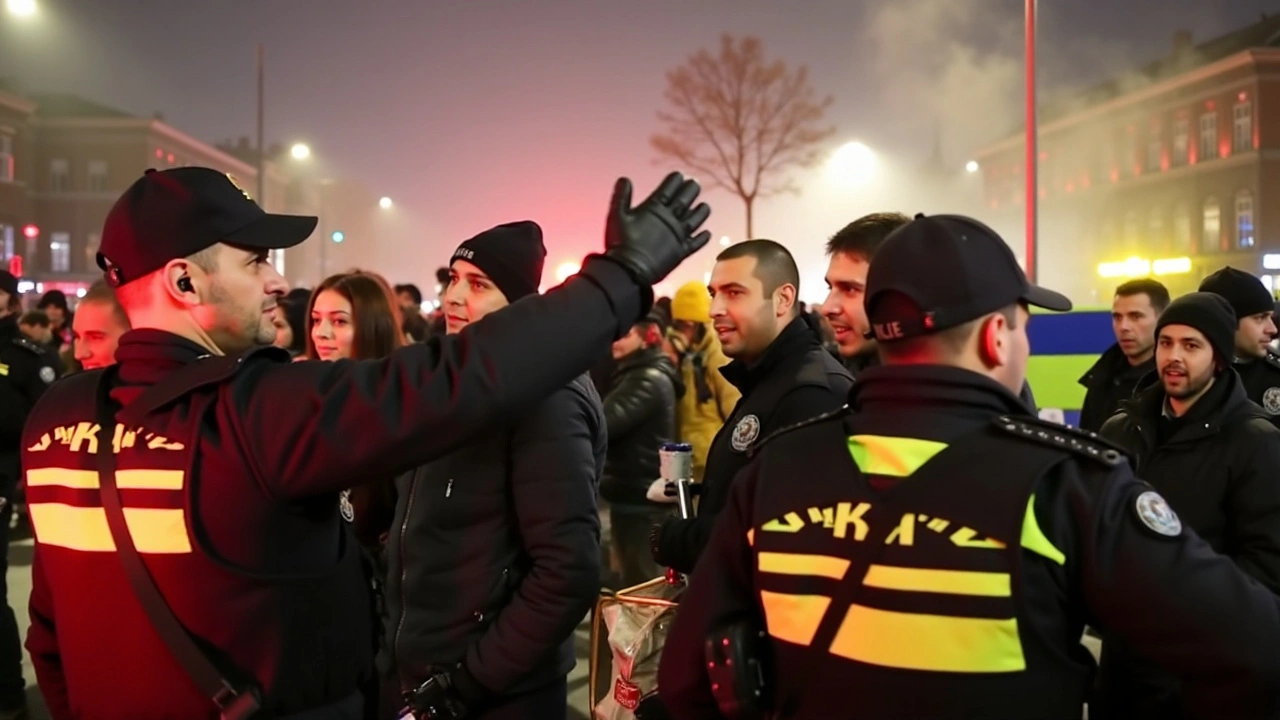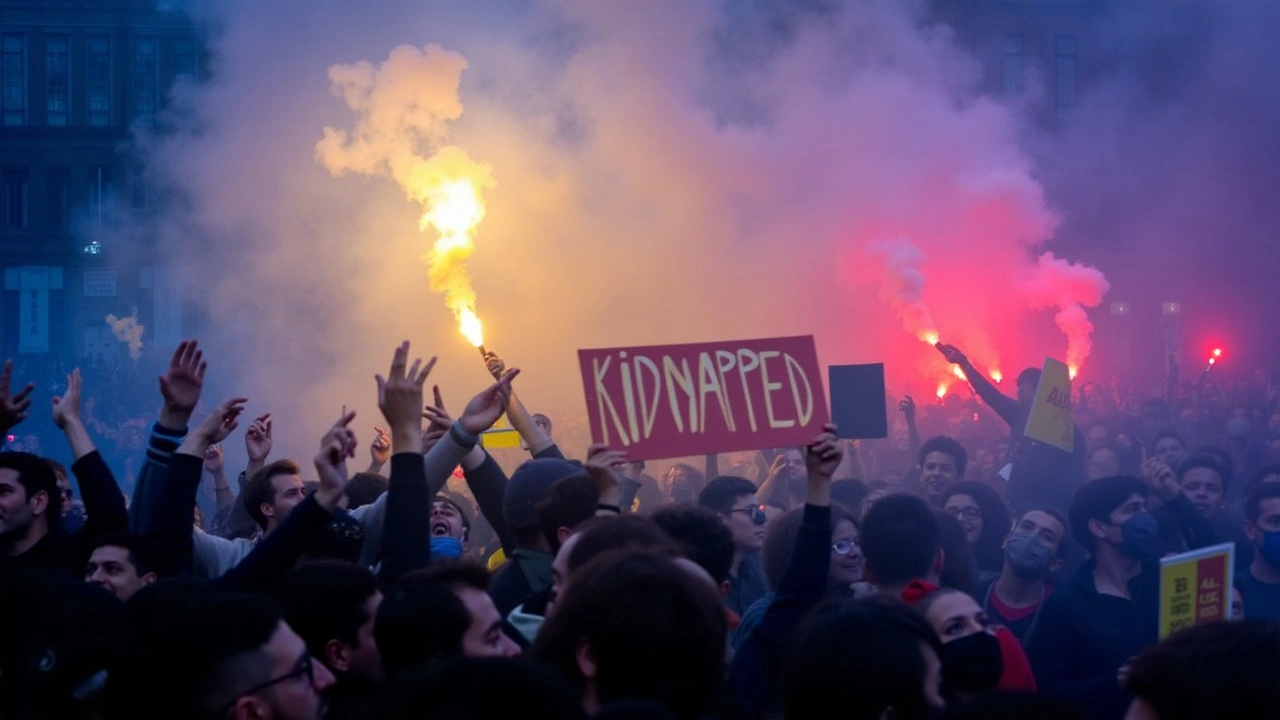Antisemitic Violence Rocks Amsterdam Following Europa League Clash
A soccer match, typically characterized by high energy and fervent rivalry, took a grim turn when violence erupted post-game in Amsterdam. Following the Europa League match between Ajax and Maccabi Tel Aviv, which ended in a resounding 5-0 victory for Ajax, Israeli football fans faced a terrifying reality. Antisemitic attackers took to the streets in search of Israeli supporters, leading to a series of violent confrontations. The troubling episode unfolded on a Thursday night—a night meant for sport turned into one remembered for its disturbing display of hatred.
Sparking International Condemnation
Both Israel and the Netherlands did not waste time in condemning the vile acts of violence. The Dutch Prime Minister Dick Schoof voiced his horror, ensuring that the rioters responsible for these antisemitic actions would face the swift hand of justice. His statement underscored the shared commitment between the two nations to stand firm against hate crimes, especially those targeting the Jewish community. Israeli Prime Minister Benjamin Netanyahu, visibly shaken by the incident’s brutality, took an aggressive stance, calling for immediate and concrete action from the Dutch government to protect Jews and citizens alike.
Rescue Efforts and Security Measures
Netanyahu's response went beyond mere rhetoric. Recognizing the gravity of the situation, he mobilized a rescue operation, dispatching two planes to Amsterdam to bring Israeli fans safely back home. His decisive actions were a stark reminder of Israel's readiness to protect its citizens abroad. The chilling images of injured fans catalyzed Israeli leaders to demand tightened security measures for Jewish individuals and communities, not just in the Netherlands but globally. These efforts underline a broader concern for antisemitism's insidious rise in recent times.
Details of the Attack
The violent incidents resulted in injuries to an unspecified number of Israeli supporters, with five requiring hospitalization. The clash led to 62 arrests by Amsterdam police, painting a vivid picture of the chaos that ensued. Authorities had attempted to pre-empt such violence with a ban on pro-Palestinian demonstrations near the stadium, imposed by Amsterdam Mayor Femke Halsema. Despite these preventive measures, tensions boiled over, highlighting the challenges authorities face in curbing spontaneous eruptions of hate-fueled violence.
Outrage from political and community leaders
Geert Wilders, a prominent Dutch nationalist and steadfast ally of Israel, didn’t mince words, branding the incident a 'Jew hunt' – a stark term that resonated with historical connotations of antihumanity. Wilders demanded severe consequences, advocating for arrests and deportations of the offenders. His reaction mirrored a broader sentiment of outrage that rippled through political circles and communities, intensifying under the sensitive discourse surrounding antisemitism. Danny Danon, Israel’s representative to the United Nations, also joined the chorus of condemnation, echoing calls for accountability and urgent diplomatic intervention.
Lessons Amidst Turmoil
The aftermath leaves an uncomfortable reflection on the intersection of sports, politics, and societal tensions. This incident not only highlights the lingering specter of antisemitism but also the crucial importance of safeguarding diversity and inclusion on the global stage. Soccer, in its essence, transcends borders and cultural divides, fostering a spirit of camaraderie and mutual respect among diverse fans. This harmony, unfortunately, was shattered by the actions of a prejudiced few, emphasizing the need for continued vigilance and solidarity in uprooting hate.
As investigations continue, both Dutch and Israeli authorities are under the spotlight to deliver justice. The incident serves as yet another reminder of the complexities and responsibilities inherent in maintaining security during large, high-profile events. As fans across the world join to condemn this hateful act, the message remains clear: football should unite rather than divide, offering a platform for global citizenship and mutual respect.

Moving Forward
The road to reconciliation will be long, but it begins with discourse, accountability, and meaningful action. Netherlands’ commitment to prosecuting those responsible marks a hopeful step towards healing the wounds inflicted by this night of negativity. Communities and nations stand at a crossroads, challenged to confront age-old prejudices head-on and collectively strive for a more inclusive and understanding future. Drawing on this momentum, the push against antisemitism, and all forms of discrimination, becomes not just a duty but an imperative, echoing loudly across stadiums and countries worldwide.


Comments
Josephine Gardiner
The events in Amsterdam undeniably underscore a disturbing resurgence of hate-fueled aggression. It is incumbent upon governmental authorities and civil society alike to reaffirm unequivocal condemnation of antisemitic violence. The swift legal response, manifest in the numerous arrests, reflects a commendable commitment to the rule of law. Nevertheless, preventive measures must be calibrated to anticipate and defuse such tensions before they erupt. Ultimately, safeguarding the dignity of all supporters remains a paramount societal obligation.
November 8, 2024 at 16:33
Jordan Fields
Antisemitic incidents are indefensible. Law enforcement acted promptly; arrests were necessary. Continued vigilance will deter future occurrences.
November 8, 2024 at 17:56
Divyaa Patel
What a night, a night that will be etched into the collective memory of every fan who witnessed the harrowing spectacle of hatred unleashed upon the streets of Amsterdam. The mere notion that a sporting event, designed to unify across cultures, could devolve into a grotesque tableau of bigotry is both baffling and infuriating. One could argue that the stadium became a crucible where simmering prejudices were finally given a stage, but that does not absolve the perpetrators from the moral abyss into which they descended. It is a stark reminder that even in the era of heightened global awareness, ancient specters of antisemitism still lurk, ready to pounce upon any perceived provocation. The injuries sustained by the Israeli supporters, the five souls who required hospitalization, are not merely statistics; they are human lives intersected by a virulent ideology. The 62 arrests, while indicative of a swift law‑enforcement response, also reveal the magnitude of the chaos that erupted, a chaos that could have spiraled even further without decisive intervention. The ban on pro‑Palestinian demonstrations, though intended as a preventive measure, underscores the delicate balance authorities must strike between security and the right to peaceful protest. Yet, the very existence of such a ban speaks volumes about the fragility of peace in a city that prides itself on tolerance. Geert Wilders' labeling of the episode as a “Jew hunt” resonates with historical echoes that should send shivers down the spine of any civilized observer. The condemnation from leaders across the political spectrum, from Dick Schoof to Benjamin Netanyahu, forms a chorus that, if translated into concrete policy, could serve as a bulwark against future assaults. However, words without action are merely hollow refrains. The broader implication, the intersection of sport, politics, and societal tensions, forces us to confront uncomfortable truths about the pervasiveness of hate. It compels us to ask whether the protective measures at future events will be sufficient or merely superficial. In reflecting upon this tragedy, we are reminded that vigilance, education, and an unwavering commitment to inclusivity must be our guiding lights. Let this dark episode serve as an impetus for robust dialogue, unwavering solidarity, and relentless pursuit of justice for those who have been wronged. The road ahead is long, but the collective resolve of communities united against hatred can, and must, pave the way to healing.
November 8, 2024 at 19:20
Larry Keaton
Yo, this whole thing is a massive wake‑up call. We gotta stand up for every fan, no matter where they're from, and make sure that hate gets shut down fast. The police did what they could, but we also need more community support, like local groups looking out for each other. This ain't just about soccer, it's about human respect, so let's keep pushin' for safer spaces for everyone.
November 8, 2024 at 20:43
Liliana Carranza
Absolutely heart‑wrenching to hear about what happened to those fans. It reminds us how vital it is to celebrate our differences rather than let fear dictate the narrative. Every supporter should feel safe cheering for their team, and that means we all have to be louder allies for tolerance. Let’s keep the conversation alive and turn this outrage into positive, inclusive action.
November 8, 2024 at 22:06
Jeff Byrd
Great, another reason to double‑check our stadium exit routes.
November 8, 2024 at 23:30